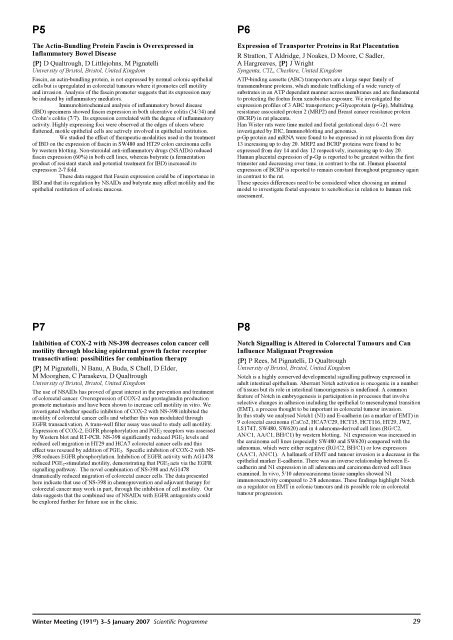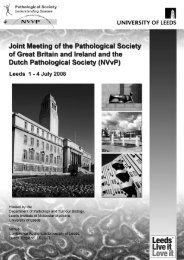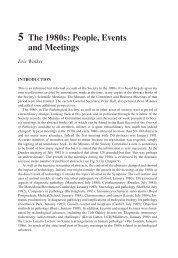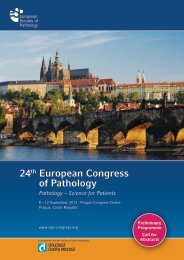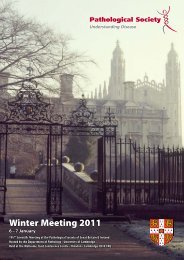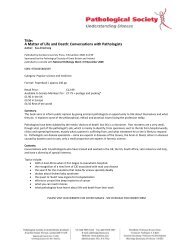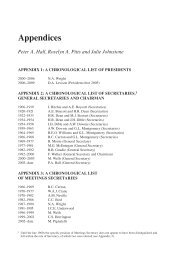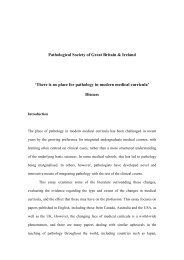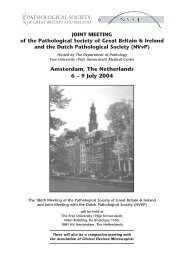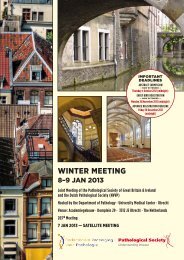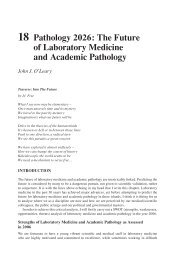2007 Winter Meeting - London - The Pathological Society of Great ...
2007 Winter Meeting - London - The Pathological Society of Great ...
2007 Winter Meeting - London - The Pathological Society of Great ...
- No tags were found...
You also want an ePaper? Increase the reach of your titles
YUMPU automatically turns print PDFs into web optimized ePapers that Google loves.
P5<strong>The</strong> Actin-Bundling Protein Fascin is Overexpressed inInflammatory Bowel Disease{P} D Qualtrough, D Littlejohns, M PignatelliUniversity <strong>of</strong> Bristol, Bristol, United KingdomFascin, an actin-bundling protein, is not expressed by normal colonic epithelialcells but is upregulated in colorectal tumours where it promotes cell motilityand invasion. Analysis <strong>of</strong> the fascin promoter suggests that its expression maybe induced by inflammatory mediators.Immunohistochemical analysis <strong>of</strong> inflammatory bowel disease(IBD) specimens showed fascin expression in both ulcerative colitis (34/34) andCrohn’s colitis (7/7). Its expression correlated with the degree <strong>of</strong> inflammatoryactivity. Highly expressing foci were observed at the edges <strong>of</strong> ulcers whereflattened, motile epithelial cells are actively involved in epithelial restitution.We studied the effect <strong>of</strong> therapeutic modalities used in the treatment<strong>of</strong> IBD on the expression <strong>of</strong> fascin in SW480 and HT29 colon carcinoma cellsby western blotting. Non-steroidal anti-inflammatory drugs (NSAIDs) reducedfascin expression (60%) in both cell lines, whereas butyrate (a fermentationproduct <strong>of</strong> resistant starch and potential treatment for IBD) increased itsexpression 2-7 fold.<strong>The</strong>se data suggest that Fascin expression could be <strong>of</strong> importance inIBD and that its regulation by NSAIDs and butyrate may affect motility and theepithelial restitution <strong>of</strong> colonic mucosa.P6Expression <strong>of</strong> Transporter Proteins in Rat PlacentationR Stratton, T Aldridge, J Noakes, D Moore, C Sadler,A Hargreaves, {P} J WrightSyngenta, CTL, Cheshire, United KingdomATP-binding cassette (ABC) transporters are a large super family <strong>of</strong>transmembrane proteins, which mediate trafficking <strong>of</strong> a wide variety <strong>of</strong>substrates in an ATP dependant manner across membranes and are fundamentalto protecting the foetus from xenobiotics exposure. We investigated theexpression pr<strong>of</strong>iles <strong>of</strong> 3 ABC transporters; p-Glycoprotein (p-Gp), Multidrugresistance associated protein 2 (MRP2) and Breast cancer resistance protein(BCRP) in rat placenta.Han Wister rats were time mated and foetal gestational days 6 -21 wereinvestigated by IHC, Immunoblotting and genomics.p-Gp protein and mRNA were found to be expressed in rat placenta from day13 increasing up to day 20. MRP2 and BCRP proteins were found to beexpressed from day 14 and day 12 respectively, increasing up to day 20.Human placental expression <strong>of</strong> p-Gp is reported to be greatest within the firsttrimester and decreasing over time, in contrast to the rat. Human placentalexpression <strong>of</strong> BCRP is reported to remain constant throughout pregnancy againin contrast to the rat.<strong>The</strong>se species differences need to be considered when choosing an animalmodel to investigate foetal exposure to xenobiotics in relation to human riskassessment.P7Inhibition <strong>of</strong> COX-2 with NS-398 decreases colon cancer cellmotility through blocking epidermal growth factor receptortransactivation: possibilities for combination therapy{P} M Pignatelli, N Banu, A Buda, S Chell, D Elder,M Moorghen, C Paraskeva, D QualtroughUniversity <strong>of</strong> Bristol, Bristol, United Kingdom<strong>The</strong> use <strong>of</strong> NSAIDs has proved <strong>of</strong> great interest in the prevention and treatment<strong>of</strong> colorectal cancer. Overexpression <strong>of</strong> COX-2 and prostaglandin productionpromote metastasis and have been shown to increase cell motility in vitro. Weinvestigated whether specific inhibition <strong>of</strong> COX-2 with NS-398 inhibited themotility <strong>of</strong> colorectal cancer cells and whether this was modulated throughEGFR transactivation. A trans-well filter assay was used to study cell motility.Expression <strong>of</strong> COX-2, EGFR phosphorylation and PGE 2 receptors was assessedby Western blot and RT-PCR. NS-398 significantly reduced PGE 2 levels andreduced cell migration in HT29 and HCA7 colorectal cancer cells and thiseffect was rescued by addition <strong>of</strong> PGE 2. Specific inhibition <strong>of</strong> COX-2 with NS-398 reduces EGFR phosphorylation. Inhibition <strong>of</strong> EGFR activity with AG1478reduced PGE 2-stimulated motility, demonstrating that PGE 2 acts via the EGFRsignalling pathway. <strong>The</strong> novel combination <strong>of</strong> NS-398 and AG1478dramatically reduced migration <strong>of</strong> colorectal cancer cells. <strong>The</strong> data presentedhere indicate that use <strong>of</strong> NS-398 in chemoprevention and adjuvant therapy forcolorectal cancer may work in part, through the inhibition <strong>of</strong> cell motility. Ourdata suggests that the combined use <strong>of</strong> NSAIDs with EGFR antagonists couldbe explored further for future use in the clinic.P8Notch Signalling is Altered in Colorectal Tumours and CanInfluence Malignant Progression{P} P Rees, M Pignatelli, D QualtroughUniversity <strong>of</strong> Bristol, Bristol, United KingdomNotch is a highly conserved developmental signalling pathway expressed inadult intestinal epithelium. Aberrant Notch activation is oncogenic in a number<strong>of</strong> tissues but its role in intestinal tumourigenesis is undefined. A commonfeature <strong>of</strong> Notch in embryogenesis is participation in processes that involveselective changes in adhesion including the epithelial to mesenchymal transition(EMT), a process thought to be important in colorectal tumour invasion.In this study we analysed Notch1 (N1) and E-cadherin (as a marker <strong>of</strong> EMT) in9 colorectal carcinoma (CaCo2, HCA7/C29, HCT15, HCT116, HT29, JW2,LS174T, SW480, SW620) and in 4 adenoma-derived cell lines (RG/C2,AN/C1, AA/C1, BH/C1) by western blotting. N1 expression was increased inthe carcinoma cell lines (especially SW480 and SW620) compared with theadenomas, which were either negative (RG/C2, BH/C1) or low expressors(AA/C1, AN/C1). A hallmark <strong>of</strong> EMT and tumour invasion is a decrease in theepithelial marker E-cadherin. <strong>The</strong>re was an inverse relationship between E-cadherin and N1 expression in all adenoma and carcinoma derived cell linesexamined. In vivo, 5/10 adenocarcinoma tissue samples showed N1immunoreactivity compared to 2/8 adenomas. <strong>The</strong>se findings highlight Notchas a regulator on EMT in colonic tumours and its possible role in colorectaltumour progression.<strong>Winter</strong> <strong>Meeting</strong> (191 st ) 3–5 January <strong>2007</strong> Scientific Programme29


